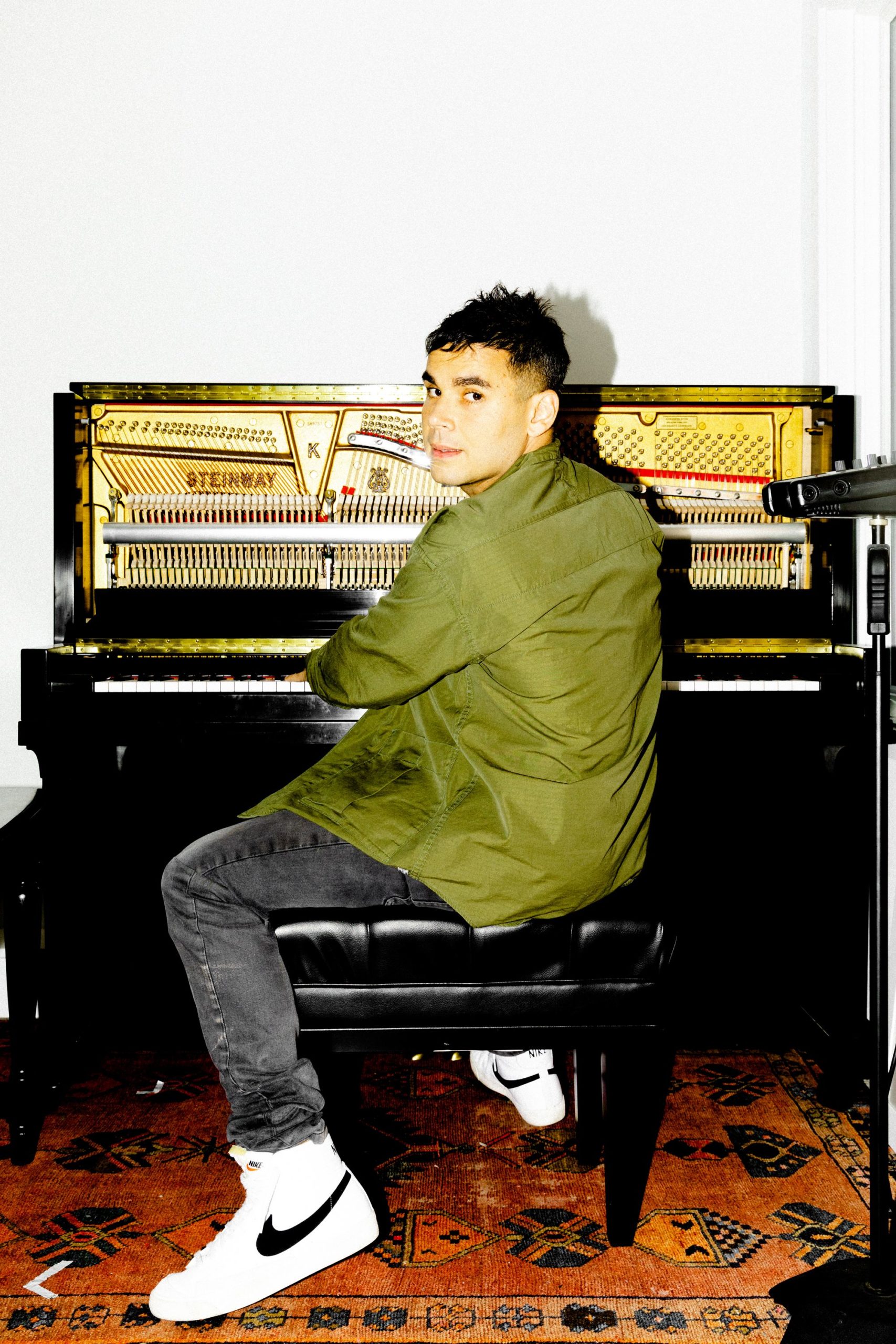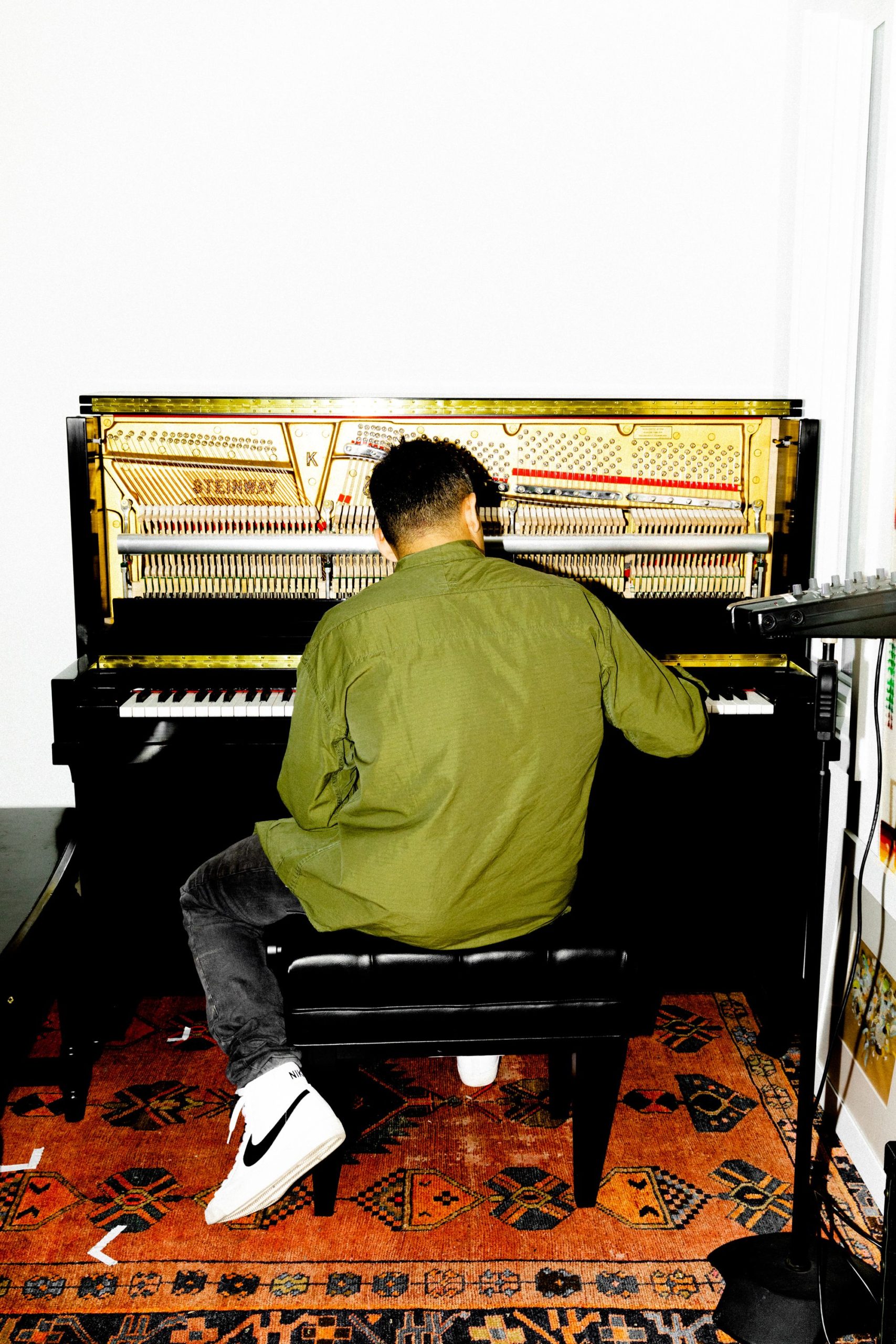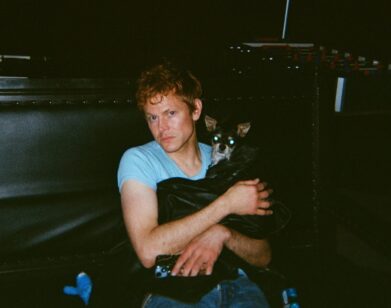In Conversation
Rostam Batmanglij and Brit Marling on Communication and Collaboration

Rostam Batmanglij was fresh out of college and working a number of full-time jobs when he produced his band Vampire Weekend’s eponymous debut studio album, and just 27 when he produced their chart-topping follow-up Contra. Ten years and countless acclaimed projects later, the producer-musician-singer-songwriter has collaborated with everyone from Haim to Frank Ocean to Charli XCX, and has three Grammy nominations under his belt.
Now, after a particularly busy 2019 and a challenging 2020 spent indoors, Batmanglij brings us Changephobia, his second full-length solo album under the name Rostam. The album, far more intimate and stripped-down offering than his typical fare, explores fear in its many forms. “This collection of songs,” he notes, “is about who we are capable of becoming if we recognize these fears in ourselves and rise above them.” This week, the artist sat down with Brit Marling, co-creator of the mind-bending TV series The OA (which Batmanglij scored), to discuss the album, and the challenging process of communication.
———
BRIT MARLING: The album is amazing. I felt like you were revealing a lot of yourself in it. There was more of your heart and how you see the world, and this mixture of the interpersonal with the political.
ROSTAM BATMANGLIJ: Thank you. That wasn’t something that I was thinking about consciously, but there are people who’ve said that to me, so maybe it does reveal something personal about me. Which I think is a good thing.
MARLING: I feel like the audience is longing for that now. Everything in our culture has become so fast and fragmented, and I feel like we’re longing to return to the feeling of losing ourselves in something. It reminded me of the early albums that really influenced or changed me, like Fiona Apple’s first album or The Miseducation of Lauryn Hill. They were albums that you listened to in their entirety, where the whole thing was telling a story.
BATMANGLIJ: Those are probably two of my favorite albums.
MARLING: I’m curious about the jazz influence in Changephobia. The way the sax appears is so mesmerizing and emotional.
BATMANGLIJ: I’ve been so inspired by classical music in the past, so I wanted to make an album that uses my love of jazz as an inspiration instead. I connected with the sax player Henry Solomon in early 2018 and he came and played on about half the album. They weren’t songs yet, just ideas, and I didn’t even imagine any sax on some of them, but as soon as he was in the room, I’d get inspired and ask him to play something. Sometimes I’d just sing a melody to him and have him play it on the sax. Other times I’d get him to improvise and build from there. There were even times where I had written sheet music, where it was more premeditated, but then once I started making the record, ideas would just flow. It was about putting myself in a situation where I could pursue what started as a big idea, and get more specific with it.
MARLING: That makes me think of how sometimes in filmmaking, it’s a lot about casting a certain actor. Like the sax, you’re inviting a group in and there’s something that can happen in real time between people where all of a sudden, things spontaneously emerge and you’re finding it in real time.
BATMANGLIJ: You and I had a little bit of that when we collaborated on the score to The OA. I remember sitting and playing keyboard in front of the rough cut of an episode, and just having you in the room affecting what I was playing.

MARLING: Which makes so much sense. I think what was hard about The OA was that it had a lot of new spaces, and you’d have to find the sound of that new space. I remember working on certain passages and thinking, “Wow, this is going to be really hard to score, I hope Rostam’s available,” because the music is the last author on a filmic work.
BATMANGLIJ: And that’s why composers often get fired.
MARLING: Yeah! Because they’re the last one to blame!
BATMANGLIJ: That’s something I learned early in my career, because I worked as an assistant to a film composer right after I graduated college. Even the biggest composers in film get fired, and the reason is because, just as you said, you’re the last author so if the film isn’t working, there’s no one left to fire.
MARLING: Also, it could be working and then you could put that last authorship on it, and it could collapse.
BATMANGLIJ: Yes! It can either collapse or it can soar, from that moment.
MARLING: When you wrote the theme song for part one of The OA, I remember we called you and I was like, “Okay, the whole show hinges on this violin melody that a little girl plays, that has to seem small and fragile, and then it has to become an anthem so epic that it can carry this big, miraculous ending. It has to work in all those spaces.” And when you sent that first version of the violin melody, I remember driving to set, blasting it in the car with Zal [Batmanglij, Rostam’s brother] and the producers, and we were like, “Oh my god, that melody is the tonal frequency of the show. If we can just hit it in casting, and performances, and the cut, we will really have something.” So it’s crazy because you weren’t just the last author, you were part of the first authorship, too.
BATMANGLIJ: It’s interesting that we’ve known each other for so long and have also worked together. When did we first meet? I’m pretty sure I was still in high school and you were in college with Zal. I remember a movie you were in with Nick Kroll that was co-directed by Zal for a 24- or 48-hour film festival. I sent a bunch of music that I was working on and some of it made it into this short film.
MARLING: Oh my god, I remember that. Mike and Zal called and asked if we could shoot it in my uncle’s apartment in New York. And Nick Kroll and I broke my uncle’s table and the cops showed up and tried to throw us out, because they didn’t believe that I was really staying there. I guess that was the beginning of our formal collaboration, which is crazy because that means we’ve been working with each other for over a decade. Was there a moment when you knew you were going to be a musician?
BATMANGLIJ: I was always very drawn to music, but it was really when I discovered recording around 14 that I felt like that was exactly what I wanted to do. So from 14 on, I knew what I was working towards. At the same time, I don’t think I started to become good at making music until maybe my sophomore or junior year at college. I spent a lot of years wanting to make music that I was proud of, but knowing that I wasn’t fully proud of it yet.
MARLING: That’s so right—you feel an inclination to express yourself in a certain way, whether that’s music, sculpture, acting, filmmaking, whatever, and in the beginning you can’t possibly be good enough to get what you’re feeling across. All these hours of practice and rigor and discipline have to come in to close the gap between what you’re feeling and what you’re able to communicate to the audience. This reminds me, one of my favorite lyrics on the album is in the song “To Communicate.” You say, “I was not able to communicate before, no I was not able to communicate before, but I am now, are you listening?” I got this wave of chills, because I understand what that means both as a person in my relationships, and as an artist. I’m finally able to start closing the gap between my imagination and my ability to put it on the page, and then on the screen. I wonder if you’re feeling that in your own life, that the gap has closed between your ability to feel something and your ability to make it tangible.
BATMANGLIJ: That lyric came out of me in one of these trance-like, drug-like states that don’t involve drugs, just me sitting in front of a piano singing and recording on my iPhone. When I wrote that lyric, I was accepting that my past self didn’t understand how important communication was, and how bad I was at communicating. As I realized that, I began to realize how I could correct it with people in my life. But like you said, it can also relate to art and I think subconsciously I was saying something about my own self-expression.
MARLING: How did you realize that you weren’t as good at communicating as you thought you were?
BATMANGLIJ: Therapy helped me understand that, but not instantly. In therapy you can have realizations that take five years to sink in, because you have to put them into practice. And that’s what communication is ultimately, it’s putting into practice what you know about yourself and sharing that.
MARLING: It’s so true. I’ve been in certain relationships, or in therapy myself, or been told something by a family member, where they say it and I’m like, “That’s patently off.” And two years later, I’ll be like, “Oh, that was correct.” We have these blindspots about who we are, and it takes some time. I like that you’re talking about the importance of time and not rushing things musically, and not rushing revelations about yourself. Modern culture is like, “Give it to me now, and give it to me great.”
BATMANGLIJ: I think I wrote the ending part of that chorus anywhere from 9 to 15 months after the first part. That is something I like about making albums, that you can let something marinate and take time to finish a song. You can get lost in it and let the song affect your life before you finish it.
MARLING: Since we’ve all been living smaller, more isolated lives this past year, is there certain music that spoke to you or got you through that period?
BATMANGLIJ: I loved Christine and the Queens’s EP and short film [La Vita Nuova]. It was something you could listen to front to back. But like I said before, anything that inspires me takes about five or ten years to sink into my soul. I would also say I entered the quarantine era with maybe 85 percent of an album written and 80 percent recorded. But as you know from filmmaking, that last 5 or 10 or 15 percent is the hardest and most important work that goes into the creative process.
MARLING: I agree completely. Something about getting to the finish line is the most excruciating because you have to decide that you’re done, and that you’re not going to do anything else to it. Closing that gap is so hard.
BATMANGLIJ: I basically spent nine months in that situation. It wasn’t hard to finish other records I was involved in as a producer, but when I make a record just as Rostam, it takes me a long time to feel like it’s done. What is something you loved in the last year?
MARLING: I just watched The Disciple, written and directed by Chaitanya Tamhane. It’s about a young musician in India who has a guru he’s very devoted to, and who’s coming of age at a time when classical music and the discipline of being devoted to a guru for decades is diminishing. There’s a version of American Idol in the film, called Fame, and there’s an obsession with Fame and becoming known and selling things. It’s at odds with the young man’s devotion to classical music. It wrestles with something that is at the nadir of art right now, especially as so much of art becomes digitized, which is: How do you hold onto the part of art that is soulful and requires time, and can’t be churned out like a capitalist widget? There’s something about the way that film was wrestling with that idea, and doing it with the most beautiful music you’ve ever heard.
BATMANGLIJ: I’m going to watch that movie tonight. It sounds so up my alley.
MARLING: I think you’d be really moved by it. Anyway, what are you feeling now? As you contemplate letting this album go into the world, what does the horizon look like to you?
BATMANGLIJ: People have to hear the album before it’s real to me. It’s not real until it’s out in the world, and once that happens, then it’s like dropping a pin on a map — it gives you a sense of location, and you can only know where to go next after that.






